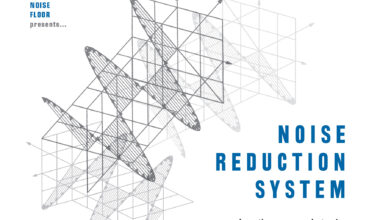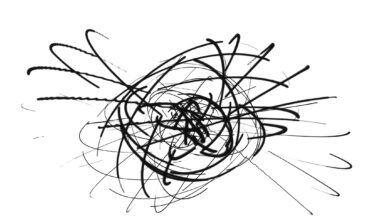A brilliant collection of improvisations from two of krautrock’s heaviest hitters

What do you get when you put two giants of the krautrock scene in a studio for three long days? Well, in this instance, you get a monster of an album; a collection of improvised music which, at times, sounds more like an orchestra of noise merchants in the midst of a 24-hour freak-out than a couple of old guys jamming with an organ and some drums in a former factory in Germany.
The two old guys are Hans-Joachim Irmler and Jaki Liebezeit. Liebezeit is best known for his work with Can, of course. His tight rhythms were probably the most crucial lynchpin of Can’s sound and are the reason most often cited for their long-lived appeal. You can’t stumble across ‘Halleluhwah’ from the masterful ‘Tago Mago’ album and not be mesmerised by Liebezeit’s contribution. Jochen Irmler, meanwhile, was creating clear vinyl artefacts for the fledgling Virgin label in the early 1970s with his groundbreaking band Faust. Faust were often a more challenging affair than Can, though no less impressive. Songs like ‘Why Don’t You Eat Carrots?’ from their 1971 debut would shift from gentle neo-classical minimalism to manipulated tape horror-noise and lyrics delivered in mass chants against a fractured jazz racket, or they could crank out proto-new wave guitar anxiety like the incredible ‘J’ai Mal Aux Dents’. They were a kind of jazz/musique concrete/krautrock mindfuck. And still are.
So the idea of these two getting together is an extremely enticing one – and the results do not disappoint.
Jaki Liebezeit’s rhythms! The man is 76 years old yet his drumming is as funky and as pulse-like as it ever was, while Irmler’s restless spirit continues the Faust ethic of sonic exploration as if the 20 years between the end of 1970s and the beginning of century 21 never happened. The fierce concentration and lack of fuss in Liebezeit’s playing is the perfect foil for his partner’s more explosive tendencies. Irmler really lets loose, conjuring sounds from his organ, presumably with a box of tricks to shape and process them into entirely new and spectral forms, confident that the beat, which responds oh-so subtly to his every jerk and flourish, will keep everything anchored.
The six pieces have titles like ‘Amalgam’, ‘Golden Skin’ and ‘Ein Perfektes Paar’ (although the review copy I received, thrillingly from “Faust Studio”, had them as ‘Stück 1’, ‘Stück 2’, etc), but in reality those are just labels to be dispensed with. This thing rolls along outside of mundane nomenclature. As Liebezeit puts it himself:
“We play without notes. In places where notation systems do not exist, the rhythm holds a much more dominant role in music, for example as is the case in Africa. Here people make music differently than those who think in terms of notes and bars. Musical bars are like prison bars.
Playing without notes means that you must play repetitively – and repetition is rhythm. At the same time, repetition does not really exist here, because you never (quite) play the same thing (twice).”
That these guys are still making music, with or without notes, and still hurtling off in chaotic new directions like the kosmische travellers they are, is something for which we should be hugely grateful.





